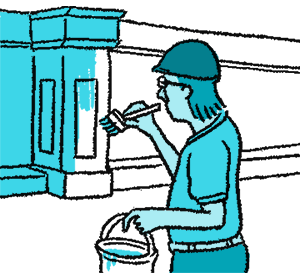Landmarks Capital
The entire community benefits when we make our historic buildings, neighborhoods, and landscapes a priority. Large and small, urban and rural: the Landmarks Capital program supports the bricks-and-mortar projects that contribute to our region’s identity.
Steps to Apply
1
What Landmarks Capital Funds
1
What Landmarks Capital Funds

Whether you are an individual owner or you represent an organization, if you are the steward of a designated historic landmark property in King County and are working to rehabilitate it, you should consider applying for a Landmarks Capital grant. Projects that center on marginalized communities and that contribute to the diversity of property types and histories represented in King County’s built environment will receive additional consideration. Landmarks Capital grants are capped at $100,000.
Please notify Program Manager Dana Phelan at 206-263-1604 of your intent to apply for a Landmarks Capital grant. If you are a first-time applicant, we recommend making an individual phone appointment to discuss your project.
Criteria
We fund all of our grants through a competitive process, carefully evaluating each application.
For this particular grant, we’ll look to see how well your project shows the following:
- Quality: you have a long-term, sustainable plan for the landmark, and your project follows good preservation principles, as outlined in the Secretary of the Interior’s Standards for Rehabilitation.
- Public benefit: your project will benefit residents and visitors of King County through the property’s visibility, accessibility, or public programming or education. Public benefit also factors in how your project will aid in the long-term preservation and use of the landmark.
- Economic impact: your project will have a positive impact on the local economy, through contractors employed, volunteer hours and in-kind donations contributed, and indirect impacts like increasing commercial activity, activating spaces, and enhancing the vibrancy of communities.
- Advancing equity: your project will contribute to the diversity of property types and histories represented in King County’s built environment, and addresses underrepresented aspects of King County history. Your project serves, includes, or delivers economic or other benefits to marginalized communities, especially communities disproportionately impacted by structural racism. This is not a requirement for funding but will be considered in the review process.
- Feasibility: you’re ready to begin the project within a year, with a prepared team, realistic budget, and credible cost estimates from experienced contractors, and you are able to complete the project on a reimbursement basis.
- Additional priorities: your project addresses an urgent need by preventing further damage, addressing critical life safety issues, or improving accessibility and ADA compliance.
Equity Investments
4Culture recognizes that where a landmark is located, as well as its community context, can affect access to funding and other resources. To take a step toward balancing these disparities, 4Culture will award additional funding to projects that are in an Equity Investment area or that are centered on marginalized communities, especially communities disproportionately impacted by structural racism.
Projects are eligible for Equity Investment funding by meeting one or more of the following requirements. Your project does not need to meet one of these to qualify for a grant; these only give certain projects priority for Equity Investment funds:
-
- The applicant or the landmark that is the focus of the project is outside of the City of Seattle.
- The applicant or the landmark is located in Seattle, but is also in a geographic area within zip codes experiencing the most significant social inequities as per the King County Communities of Opportunity (COO) index. COO designated areas are shown in purple on the map below.
- OR the panel of peer reviewers determines the applicant merits additional funding based on their score on the Advancing Equity criterion.
- Organizations with an annual budget over $5 million do not qualify for this additional funding.
Firefox users: you may find it easier to view the map using this link.
Public Benefit: Why It Matters
4Culture is a public agency supporting the cultural sector through revenue from Lodging Tax, 1% for Art, and Doors Open funding sources. Core to our work and defined in our Charter is a requirement that everything we fund serves the public interest, enriching communities throughout King County.
We define Public Benefit as the opportunity for King County residents and visitors to access and engage in arts, science, and other cultural activities, events, communities of practice, historic and cultural spaces, and works of public art related to our program areas. It is also a service requirement for all recipients of funding from 4Culture. Public benefit makes it easier to experience culture.
Here are some ways historic preservation projects may benefit the public:
- The landmark property has high visibility in the community, is accessible to the public, or is a part of historical programs or tours.
- Investment in your landmark property will help promote economic activity in the neighborhood or have other positive impacts in your community.
- Your project will contribute to the long-term viability and use of the landmark property.
- Your project will contribute to the diversity of property types and histories represented in King County’s built environment.
2
Are You and Your Project Eligible?
2
Are You and Your Project Eligible?

You
- We accept applications from individuals, businesses, organizations, and local governments that are either the owner or long-term leaseholder of a historic property in King County.
- Your property must be designated as an official landmark at the city or county level, or be a historic building within a locally designated historic district. Properties listed in the National Register of Historic Place are eligible only in jurisdictions without a local historic preservation ordinance. Please contact 4Culture staff if you have questions about the eligibility of your property.
- If funded, you must provide a W-9 form, sign a contract that limits 4Culture’s liability, and provide proof of liability insurance that names 4Culture as Additional Insured.
- This grant is not available to K-12 schools or school districts.
Your Project
- You may request up to $100,000. Matching funds are not required.
- Your project can include materials, labor, permits, and fees, as well as architectural design and engineering directly related to construction costs. Project management costs may be up to 15% of the award amount.
- Doors Open-eligible cultural or science organizations that receive Sustained Support may also request support for the acquisition of a designated landmark or historic property in a local historic district, as part of a long-term plan to rehabilitate the property.
- Your project should focus on the stabilization or restoration of historic building fabric, repair or replacement of essential building systems, or the restoration of historically significant landscapes.
- Landmarks Capital funds may not be used for new additions, equipment purchases, planning and pre-development studies, general operating support, overhead costs, employee benefits, or any regular staff salaries. For equipment purchases, please see our Equipment grant.
3
Helping You Succeed
3
Helping You Succeed

Workshops
Workshops can make a big difference in the strength of your application. They’re an opportunity to walk through the application with the Program Manager and hear questions that other applicants have.
For virtual workshops, please register via the links provided to receive Zoom meeting information. One workshop will be held in-person at the 4Culture office. Registration for the in-person workshop is not required.
Virtual and in-person office hours are another opportunity to ask questions. There will be no formal presentation in the office hours sessions.
If you are unable to attend the scheduled workshops, you can view this recorded workshop:
Resources
Video
Watch this step-by-step application tutorial video to assist you through the process of creating an account, starting your application, and saving it for later.
Worksheet
Download the 2025 application worksheet, which includes the full application with helpful tips. You can use this to work offline, draft your responses, and then copy-and-paste them into the online application.
Sample Application
Review this sample application that successfully received funding in 2023. Please note that to minimize the file size, this sample does not include photos, but photo uploads are required as part of the Landmarks Capital application. You can also view past years’ grant recipients our Awardees page.
Contact
Staff are here to assist you! If you have any questions, please email or call at any time. Please notify Dana Phelan of your intent to apply, and arrange for an individual phone appointment if you are a first-time applicant.
We are happy to review draft applications and provide feedback with adequate notice. For full draft reviews, save your work in the online application and contact Dana Phelan before Monday, June 11. After that date, we cannot review full drafts, but will still be available to assist with specific questions and/or troubleshooting.
For general inquiries and technical support:
Maisha Barnett
206-477-9877
We will make every effort to ensure equal access for all applicants. If you require accommodations, please contact us.
You can also view last year’s funded applicants on our Past Grants page.
Translation and Assistance
The guidelines, a detailed explanation of how to apply, and the application are in English. If this is a barrier that stops you from understanding the grant or applying due to limited English writing ability, visual impairment, or you would like to request assistance to create an application, please contact or call (206) 296-7580 or TTY 711, and we will make sure you get the support you need.
Русский (Russian)
Руководство, подробная инструкция и форма заявки на английском языке. Если вам сложно разобраться в процедуре получения грантов или подачи заявок из-за ограниченных навыков письменного английского языка либо нарушений зрения, а также если вы бы хотели обратиться за помощью при составлении заявки, отправьте письмо на адрес электронной почты или позвоните по номеру (206) 296-7580 или 711 (телетайп), и мы позаботимся о том, чтобы вы получили необходимую помощь.
Soomaali (Somali)
Tilmaamaha, sharaxaadda faahfaahsan ee ku saabsan sida loo codsado, iyo waraaqda codsiga waxa ay dhammaan ku qoran yihiin Af-Ingiriisi. Haddii ay arrintani tahay caqabad kaa hor istaageysa fahamka deeqda ama codsashada oo ay sabab u tahay awoodda qorista Af-Ingiriisiga oo xadidan, araggaaga oo liita, ama aad jeclaan lahayd inaad codsato in lagaa caawiyo in aad codsi sameyso, fadlan la xiriir ama wac (206) 296-7580 ama TTY 711, waxaana xaqiijin doonnaa inaad hesho taageerada aad u baahan tahay.
Español (Spanish)
Las pautas, la explicación detallada de cómo enviar la solicitud y la solicitud están en inglés. Si esto le impide comprender la información relacionada con la beca o enviar una solicitud debido a una limitación en la capacidad para escribir en inglés, si tiene una discapacidad visual o si desea recibir asistencia para crear una solicitud, escriba a o llame al (206) 296-7580 o TTY 711, y nos aseguraremos de que obtenga la ayuda que necesita.
Tiếng Việt (Vietnamese)
Hướng dẫn, giải thích chi tiết về cách nộp đơn va tài liệu áp dụng tất cả đều bằng Tiếng Anh. Nếu đây là rào cản khiến quý vị không hiểu được khoản trợ cấp hoặc cách nộp đơn do khả năng viết tiếng Anh hạn chế, do quý vị bị suy giảm thị lực hoặc muốn yêu cầu hỗ trợ để tạo đơn đăng ký, làm ơn liên hệ hoặc gọi (206) 296-7580 hay TTY 711 và chúng tôi sẽ hỗ trợ những gì quý vị cần.
4
After You Submit
4
After You Submit

Timeline
The deadline for this grant is Wednesday, June 25, 2025, at 5:00 pm PDT. We will announce our funding decisions following our Board of Directors’ approval of the awards on September 24, 2025. You can start your project—or the portion of your project described in your application—no earlier than September 25, 2025, and you must complete it by December 31, 2027.
Panel Process
4Culture staff will review your application to ensure eligibility. A panel of historic preservation specialists and community members, which changes annually, then evaluates all eligible applications. 4Culture staff facilitates the panel process but does not vote or try to influence the outcome. The panel selects and recommends projects to the 4Culture Board for funding, based on the criteria outlined above in the What Landmarks Capital Funds section of this page.
Contracts and Payment
If the 4Culture Board approves your project for funding, your grant manager will work with you to create a contract outlining a payment schedule.
Requirements and Appeals
Learn about what will be required if you are awarded a grant, and about the process for appeal of a 4Culture decision.
5
Apply
5
Apply

Once you’ve started your application, you can save it as a draft and continue to work on it up to the deadline. Once you click Submit, your application is final. Please do not hesitate to contact us if you have any questions during the process.
What’s in the Application
The online application includes questions connected to the criteria for this grant, and a project budget. You must complete all required fields in the online form in order to submit your application for review. Read all the instructions carefully, answer all the questions as thoroughly as possible, and complete the project budget to the best of your ability.
Below, you will find information on additional support materials. We recommend assembling them early in the application process and encourage you to call or email us with any questions as you work on these materials.
Project Narrative
Peer-panel reviewers may not be familiar with your property. You will be asked to answer the following questions in the application narrative section:
- Quality/Project Description
Briefly describe the historic property, including its historic significance and its current condition. State your long-range goals for the preservation and use of the property. Then, provide a description of the specific work for which you are requesting funding from 4Culture. If you are requesting funds for repair or rehabilitation, explain how this work is good preservation practice, as outlined in the Secretary of the Interior’s Standards for Rehabilitation, and why you are prioritizing this project. If you are requesting funds for acquisition, explain how this will advance historic preservation along with your organization’s mission. (Note: you may request acquisition funds ONLY if you are a Doors Open-eligible cultural or science organization. - Public Benefit
How will your project benefit the larger community? Public benefit might include a property’s high visibility, improvements to accessibility or safety, and/or public programming or education. How will this project aid in the long-term preservation and use of the property? - Economic Impact
How will your project support the local economy? This can include contractors employed, volunteer hours and in-kind donations contributed, and other spending. You may also describe indirect impacts like increasing commercial activity, activating spaces, or enhancing the vibrancy of communities. - Advancing Equity
Is your property associated with an underrepresented aspect of King County history? For example, does the property have a historic connection to marginalized communities? If so, how is this story told? Does use of the property serve or support marginalized communities? Will the rehabilitation of the property deliver economic or other benefits to marginalized communities? These elements of your project are not required, but they will be considered in the review process. If the above questions do not apply to your project, you may simply state so. - Experience
Tell us about the background that you, your subcontractors, and others on your project team will bring to this project to make it a success. (Examples might include training, experience, or networks in preservation, construction, community development, and/or grant management.) - Feasibility/Implementation
Outline your project schedule, including your plan to obtain any approvals needed from your local historic preservation staff, board, or commission. What other cash or in-kind support is available for the project? If awarded only partial funding, how will you proceed?
Demographic Information
Your profile in our portal must provide demographic information for the current year, for yourself, and if you are applying as an organization, for your board and staff. We use this information to help us understand how well we are doing in our efforts to reach all communities in King County. The demographic information must be complete when you submit your application, by the June 25, 2025 deadline. Demographic information is not used to make funding decisions.
Contractor Bids
At least one contractor bid or architectural estimate for the proposed project is required. You may include a second estimate if you have one, but specify which you intend to use and why.
Images
Please submit five to eight digital color images that have all been taken within the last six months. JPG format is preferred, no larger than 2 MB each. Please indicate photo contents in the file name, for example “north_facade,” “neighborhood_context,” or “window_detail.”
Images must show:
- The property in its setting or neighborhood context.
- Exterior of primary structure.
- Features (exterior or interior) affected by proposed project.
Supplemental Materials (Optional)
You may submit letters of support, any existing master plans, studies, or assessments, or any existing site plans, drawings, or sketches that directly support your project. Be selective – these materials are not required.
